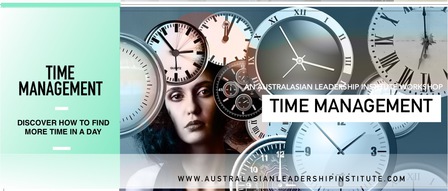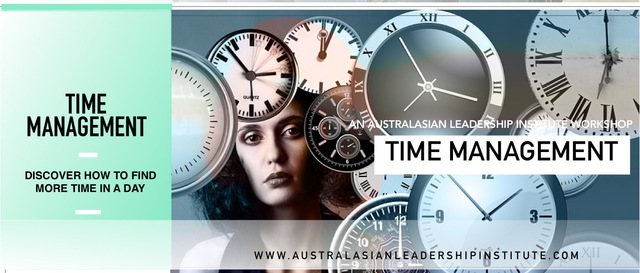8 Ways To Do More In Less Time
Eight Ways To Do More In Less Time
By Mark Wager
Do you know the most common question that leaders ask me? As a Leadership Coach I go into organisations and spend time with the leaders individually to help them design strategies to deal with difficult team members, difficult clients and even difficult bosses. During these conversations I often get asked a number of questions and despite the different industries and countries I work in there is one question that is raised more than any other and that is how do I find more time?
There’s a strange pattern of behaviour in business today. When someone works hard and achieves all their goals because of working long hours, their Boss naturally wants to reward them so they approach their star performer and congratulate them on their work and then hand over their reward, more work. What kind of reward is that? Surely receiving less work is a better reward than getting more work and it’s not like they are given more time to do the extra work. If you are good you will be rewarded with higher expectations of what you are capable fo achieving. This pattern continues until people fail, it’s a strange pattern but is one which is present in many businesses. We are constantly asked to achieve more with less, so how do we break this cycle?
In business you can buy many things, you can buy experts to give you advice, you can update your equipment and even hire more staff but the one thing you can’t buy is time. The most important factor to success is time because it’s limited, there are only so many hours in a day so it’s vital that you take advantage of every hour and minute available.
In this article I want to share with you some practical tips on better time management. You might not find that every tip is applicable for your situation but the ones that are will make a big difference to your day.
Stop multi-tasking
You can’t change the amount of time you have but you can improve how effective you are within that time. You can start by stopping multi-tasking.The most effective way to increase your productivity is to focus on a singular task and remain on that task until it is finished and once finished move on to the next task. Stop multi-tasking because the time you believe you are saving in the short term is negated because it’s taking you longer to complete the tasks because your focus is elsewhere.
Set deadlines
I’ve found that in many workplaces, work expands in order to fill the time available. In order to stop this set yourself deadlines for when specific areas of work have to be completed by. If you want to guarantee that the deadline is met then set consequences that come into play if it’s not. I worked with two people who both had long term goals that they never had got around to, one was to write a book and the other was to speak to a ceo about their career prospects, both important goals but both had been put off time and time again. They then both decided to set deadlines, they also swapped phone numbers and made a deal that if they didn’t reach their goal by the deadline then they would pay the other person $100. This combination of deadlines and consequences guaranteed that they both achieved their goals.
Remove your distractions
When we are in the middle of performing a complex task and we are interrupted studies have shown that it takes approximately 18 minutes to get back to the same level of productivity that you were at when you were interrupted. If you want to increase productivity then reduce interruptions, turn off your phone, stay off the internet, I have an office that has no internet connection to minimise distractions. Consider putting on an auto reply onto your emails so that people know when you will be unavailable or even something as simple as asking people not to disturb you unless it’s absolutely urgent. All of these will help you.
Keep your mind fresh
The most simplest of all time management techniques is to get a good nights sleep. The old idea of just working longer hours in order to get stuff done is not a long term option as you may be doing more hours but you become far less effective. According to a study by a British medical journal if you go 17 hours without sleep your brain performs the same way as it would if you had a blood alcohol concentration of 0.05. No matter how much work you have to do, get a good nights sleep and you will be in a better position to handle the workload when you are well rested.
Work when you are most productive
Tasks can be broken down into one of two categories which are either cognitive or non-cognitive. A cognitive task requires you to think about the task, make decisions and be creative so it requires brain power. A non-cognitive task is more manual and doesn’t require you to think as much. Productivity increases when you perform cognitive tasks at a time that you have most energy so if you are a morning person that is the best time for you to focus on the cognitive tasks yet if you naturally more energetic in the evening then that is the best time.
Turn off your email alerts
Here’s an interesting fact that you didn’t know about email. Studies have shown that for every email you send out on average you will receive 1.2 emails back. This means that if you focus solely on email then you will never get free because work will always increase. Email is without doubt a valuable business tool but it can easily control your day rather than the other way around so start by turning off your email alerts and instead check your emails at specific times rather than allowing emails to interrupt your day. Remember your email list is someone else’s idea of what your priorities should be.
Get into a routine
Every productive person I have ever met has a routine. There are certain things they do everyday at a certain time without question. A good tip that I’ve adopted myself is to start the first hour of the day in a structured fashion. This first hour should be so structured so that you could if you had to delegate these tasks to someone else. This start gets you into a routine allows you to check off a number of items from your to -do list and sets the tone for what is hopefully a productive day. Win the morning and you win the day.
Break big protects into steps
Our brain works at its most optimal when the task that needs to be completed is between 6-10% beyond your current ability. When a task is difficult enough for you to push yourself yet not too difficult that it seems pointless it’s in this range that the brain releases dopamine. You know the feeling you get when you have a sense of achievement. Well! that’s dopamine being released in your brain. When faced with a task that seems too big that you don’t know when you start then it’s because the task is beyond your 6-10% range so break down the task into smaller bits that fit within that dopamine range so for example if your goal is to write a book but you never start then change your goal to write one good chapter instead. Remember that every long journey consists of many small steps.
There will always be more work than time. Especially if you are good at what you do so embrace these tips and learn how to do more in less time.
Posted: Monday 29 January 2018


